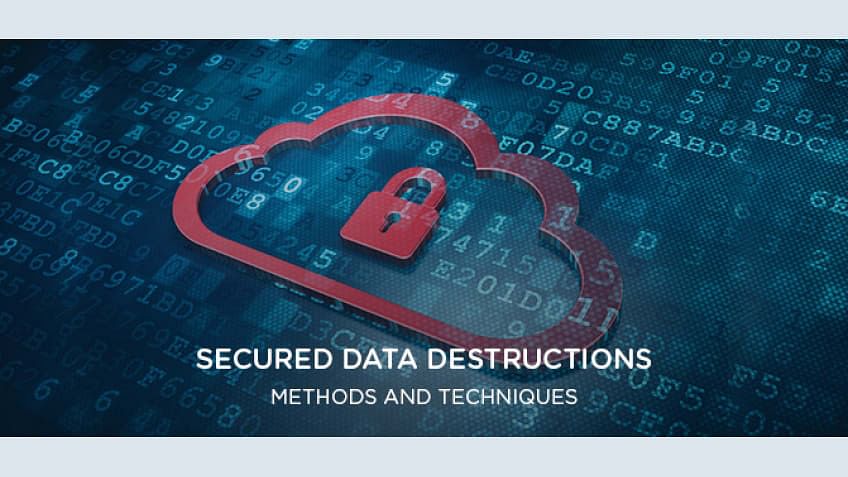Vital Cyber Security Practices for Effective Data Destruction Techniques
Wiki Article
The Vital Nature of Information Devastation in Upholding Computer System Security Services and Protecting Against Unauthorized Access
In an era where data violations and identification burglary are significantly common, the significance of effective data destruction can not be overemphasized. Organizations needs to acknowledge that the failure to correctly deal with sensitive information positions not only legal and monetary threats but additionally a potential erosion of client depend on. Different methods, from information wiping to physical damage, function as crucial safeguards versus unapproved accessibility. Nevertheless, comprehending the ramifications of data destruction techniques and compliance with policies raises crucial inquiries concerning the competence of current approaches and their long-lasting practicality despite progressing hazards.Relevance of Data Devastation
In a significantly digital globe, the relevance of data devastation can not be overstated. As organizations accumulate substantial amounts of delicate info, the prospective effects of stopping working to effectively get rid of and manage of that data become progressively extreme. Information breaches, identification burglary, and business reconnaissance posture considerable threats, underscoring the necessity of effective data devastation practices.
Additionally, as modern technology progresses, so also do the approaches through which destructive stars seek to make use of sensitive information. Organizations must continue to be cautious and aggressive in their data destruction strategies to protect against these developing hazards. By prioritizing information destruction, firms not only safeguard their assets but additionally foster depend on among stakeholders and customers, demonstrating a commitment to accountable data administration and safety techniques.
Techniques of Effective Data Destruction
To ensure the total and permanent devastation of delicate data, companies can utilize a selection of effective approaches tailored to their certain needs. Among the most common techniques is data wiping, which entails using specialized software to overwrite existing data multiple times, making healing essentially impossible. This is particularly useful for solid-state drives and hard drives, where traditional deletion methods are poor.One more efficient technique is degaussing, which uses strong magnetic areas to disrupt the magnetic domain names on storage media, providing the data irretrievable. This method is particularly suited for magnetic storage space tools, such as tape drives and hard drives.
Physical destruction is additionally a feasible alternative, including the shredding, squashing, or incineration of storage tools. This approach guarantees that information can not be recuperated, making it optimal for companies taking care of very delicate info.

Conformity With Information Security Laws
Organizations should not just concentrate on effective data destruction techniques yet additionally guarantee compliance with data security laws that regulate just how sensitive info is taken care of and disposed of. Abiding by these laws is important for safeguarding individual information and maintaining customer depend on. Laws such as the General Data Security Guideline (GDPR) in the European Union and the Wellness Insurance Coverage Mobility and Accountability Act (HIPAA) in the USA enforce stringent guidelines on data monitoring, which include demands for the secure disposal of delicate details.To attain conformity, companies should execute comprehensive data destruction policies that straighten with these lawful structures. This consists of recognizing information that calls for damage, developing methods for secure methodsâEUR" such as shredding why not look here physical media or making use of software program that satisfies industry criteria for information wipingâEUR" and preserving comprehensive documents of destruction tasks. Normal audits must be carried out to guarantee adherence to these plans and to identify any kind of prospective areas for renovation.
Failing to follow information security policies can cause significant lawful implications, consisting of substantial penalties and damage to a company's online reputation. Integrating compliance right into information damage methods is not only hop over to these guys a legal obligation yet also a crucial element of a durable info safety and security approach.
Repercussions of Poor Data Handling
Poor information handling can bring about extreme repercussions that prolong beyond prompt operational troubles. Organizations might deal with considerable financial losses as a result of data violations, which frequently cause expensive removal initiatives, lawful fees, and regulatory fines. These monetary ramifications can strain sources and impede development, inevitably impacting a company's profits.
In addition, bad data handling can drastically harm a company's reputation. Companions, consumers, and stakeholders may shed trust fund in an entity that stops working to shield sensitive information, bring about decreased client loyalty and potential loss of organization possibilities. This disintegration of trust fund can take years to restore, if it can be recovered at all.
Furthermore, companies could encounter lawful implications occurring from non-compliance with data protection regulations. Such offenses might result in investigations and penalties, compounding the economic burden and additional tainting the company's picture.
In the realm of cybersecurity, poor information management methods can produce vulnerabilities that make systems a lot more prone to unapproved accessibility and cyberattacks. Eventually, these consequences emphasize the essential importance of applying durable information dealing with procedures to secure delicate information and preserve business honesty.
Best Practices for Secure Information Disposal


Firstly, data must be classified according to its level of sensitivity. Delicate info needs more strenuous disposal approaches, such as shredding physical documents and making use of innovative software application for digital data wiping. Employing licensed information devastation services makes certain conformity with sector guidelines and requirements.
Secondly, organizations should apply a data disposal plan that mandates regular audits. This policy needs to describe the treatments for data retention and damage, making sure that out-of-date information is gotten rid of immediately and firmly. Training staff members on these methods is necessary to fostering a society of safety and security understanding.
Last but not least, keeping in-depth records of disposed information boosts accountability and offers a clear audit trail. This documentation should consist of the kind of information destroyed, the technique made use of, and the day of disposal.
Final Thought
Finally, the critical of reliable data damage is apparent in its duty in enhancing computer security solutions and alleviating unauthorized access risks. Taking on durable methods such as data cleaning, degaussing, and physical damage, together with compliance with guidelines like GDPR and HIPAA, is vital for securing sensitive information. Ignoring appropriate important link information disposal practices can result in serious repercussions, consisting of information violations and lawful repercussions. Carrying out finest techniques in safe and secure data disposal eventually fortifies business integrity and client trust.In an age where data breaches and identity burglary are significantly widespread, the significance of reliable information damage can not be overemphasized. data destruction. Data violations, identification burglary, and company reconnaissance pose substantial risks, emphasizing the necessity of effective information damage techniques
Conformity with guidelines such as GDPR and HIPAA mandates that companies apply strict information defense measures, including the safe and secure devastation of data at the end of its lifecycle.
By focusing on data damage, firms not only safeguard their properties but also foster trust among customers and stakeholders, showing a dedication to accountable information administration and protection methods.
Organizations need to not only concentrate on efficient information devastation approaches but also guarantee compliance with data defense laws that regulate just how sensitive info is taken care of and disposed of.
Report this wiki page